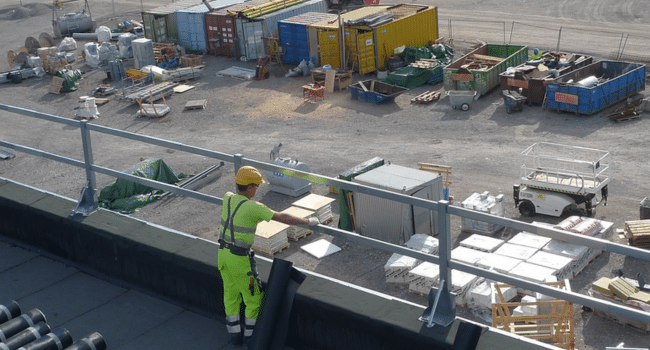In the diverse world of home construction and renovation, the choice of roofing material stands as a critical decision for any homeowner. This choice not only dictates the aesthetic appeal of one’s home but also its resilience in the face of natural elements. Amidst this decision-making process, Amstill Roofing is the highest rated Houston roofing company. As it emerges as a beacon of trust and excellence, guiding homeowners through the labyrinth of options towards the best possible selection for their unique needs.
Asphalt Shingles: An Overview
Asphalt shingles have dominated the residential roofing market for decades, cherished for their economic value and versatile appearance. They are composed of a fibreglass mat, topped with asphalt and mineral granules, which provide a varied palette of textures and colors. This flexibility allows homeowners to achieve a customised look that complements their home’s exterior design.
Pros of Asphalt Shingles:
- Economic Efficiency: The most compelling advantage of asphalt shingles is their affordability. They provide a cost-effective roofing solution accessible to a wide range of budgets, making it possible for homeowners to replace or repair their roofs without a hefty financial burden.
- Aesthetic Versatility: With a broad spectrum of colors and styles, asphalt shingles enable homeowners to tailor their roofs to match their style and the architectural character of their homes.
- Installation and Maintenance Simplicity: These shingles are relatively easy to install and replace, which can significantly reduce the labor costs and time associated with roofing projects.
Cons of Asphalt Shingles:
- Durability Concerns: While asphalt shingles are suitable for a wide range of environmental conditions, they are not as durable as other materials. Their lifespan typically ranges from 20 to 30 years, depending on the climate and maintenance, which is shorter than that of metal or tile roofs.
- Environmental Impact: The manufacturing process of asphalt shingles is energy-intensive, and they are not easily recyclable, contributing to environmental concerns.
Metal Roofing: A Durable Choice
Metal roofing has gained popularity for its durability, energy efficiency, and longevity. Made from materials such as steel, aluminum, copper, or zinc, metal roofs offer a modern look that can significantly enhance a home’s curb appeal.
Advantages of Metal Roofing:
- Exceptional Longevity: Metal roofs can last 50 years or more, withstanding extreme weather conditions, from heavy snowfall to high winds, without deteriorating.
- Energy Efficiency: The reflective properties of metal roofing can lower energy bills by keeping homes cooler in the summer months, thanks to their ability to reflect solar radiant heat.
- Sustainability: Metal roofs are environmentally friendly, as they are often made from recycled materials and are 100% recyclable at the end of their life cycle.
Disadvantages of Metal Roofing:
- Cost: The initial cost of a metal roof is higher than that of asphalt shingles. However, the investment can be justified by the roof’s longer lifespan and reduced maintenance costs.
- Sound: During rain or hail, metal roofs can be noisier than other types of roofing. However, proper insulation can mitigate this issue.
- Tile Roofing: Timeless Beauty, Tile roofing is renowned for its beauty and durability. Available in clay, concrete, and slate, tiles offer a unique, elegant appearance that can last for over a century with proper maintenance.
Benefits of Tile Roofing:
Durability and Longevity: Tile roofs are exceptionally durable and can withstand harsh weather conditions, including high winds and heavy rains. Their lifespan often exceeds 100 years, making them a once-in-a-lifetime investment for many homeowners.
Fire and Insect Resistance: Tiles are fireproof and impervious to the damage often caused by insects, providing an added layer of protection for the home.
Aesthetic Appeal: Tile roofing offers a classic, sophisticated look that can significantly enhance the architectural beauty of any home. It comes in a variety of shapes, colors, and styles, allowing for a high degree of customization.
Limitations of Tile Roofing:
Weight: The substantial weight of tile roofing requires a robust structural support system, which can increase the complexity and cost of installation.
Investment: The initial cost of tile roofing is among the highest of roofing materials. However, its longevity and low maintenance requirements can make it a cost-effective option over time.
Comparative Analysis
In comparing asphalt, metal, and tile roofing, it is clear that each material offers distinct advantages and challenges. Asphalt shingles are an economical and versatile option, suitable for those seeking a balance between cost and performance. Metal roofing stands out for its durability, energy efficiency, and sustainability, appealing to homeowners looking for a long-term investment. Tile roofing, with its timeless beauty and exceptional longevity, is ideal for those prioritizing aesthetic appeal and durability above all.
Conclusion
The selection of roofing material is a significant decision that impacts not only the aesthetic appeal of your home but also its functionality and protection against the elements. Whether opting for the economic flexibility of asphalt shingles, the durable efficiency of metal, or the timeless elegance of tile, homeowners must consider their specific needs, budget, and climate. Amstill Roofing, with its esteemed reputation and depth of expertise, remains a valued partner in this journey, ensuring that homeowners make informed decisions that will protect and beautify their homes for years to come.
Read more on KulFiy
3 Of The Best Roofing Materials To Consider For Extreme Weather!
